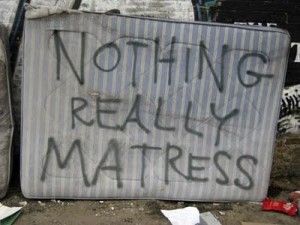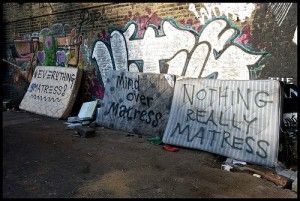It’s mind over mattress with more regulations
by CalWatchdog Staff | April 9, 2013 9:05 am
April 9, 2013
By Katy Grimes
 [1]
[1]
As if manufacturers need any more California regulations to contend with, a new bill would require mattress manufacturers to organize, operate and pay for all mattress recycling in the state.
But it’s already illegal to dump a mattress, isn’t it? Yes it is.
There actually are two mattress bills moving through the Legislature right now. SB 254[2] by Sen. Loni Hancock, D-Berkeley, would mandate mattress manufacturers to pay the entire cost of mattress recycling — a cost which would undoubtedly be tacked on to the price of a new mattress. Hancock’s bill would not specify how this recycling would take place, leaving many to assume Californians would still see abandoned old mattresses lining city streets.
The cost of Hancock’s bill is estimated to be at least $24 per mattress.
The other bill, SB 245[3], is a far more creative and non-government, long-term solution. It would require the creation of a non-profit organization, which would operate a new mattress recycling program.
SB 245 by Sen. Lou Correa, D- Santa Ana, would set far more realistic and attainable goals, and create a sustainable funding source for this nonprofit.
SB 245 kills two birds with one stone: The fee to the consumer, about $5, would be less than if Hancock’s bill is passed; and there would be an organized, statewide non-profit organization to manage the mattress recycling.
State legislators usually create bills looking for a problem, but Correa’s bill actually appears to be a bill addressing a big problem in the state — at least if it is a problem, according to Hancock.
Nothing really mattress
Christopher Hudgins, with the International Sleep Products Association[4], said in an interview there are several issues with old mattresses, besides the unsightly abandoned mattress street litter in some areas of the state. Faced with Hancock’s bill and a potential mandate, his association worked up an alternative solution.
Many mattress manufacturers already recycle old mattresses — the materials are highly recyclable. But it is expensive and labor-intensive, according to Hudgins. And some mattress manufacturers say they recycle the old mattresses, not by destroying them, but by selling them to a third party for refurbishment and eventual resale. The problem is, the old mattresses aren’t always refurbished.
In 2008, NBC Dateline did an investigation[5] on reconditioned, resale mattresses. In what originally sounded like a real sleeper of a story, Dateline found[6] that some mattresses which were supposed to be stripped, sterilized, re-covered and resold, had a host of surprises inside.
“Beneath new covers, filthy old materials were contaminated with urine, fecal matter and dangerous fungi, all of which can seep out through the cover over time,” Dateline reported. “We also found a dead bedbug with its eggs.”
Sleepy mattress sales are a thing of the past
“The International Sleep Products Association’s ‘Bedding Barometer’ reports[7] wholesale mattress sales in the U.S. were up 11.7 percent last year, compared to 2011, while year-to-date unit shipments increased by 7.6 percent,” MSN Money recently reported[8].
IBISWorld[9] says the mattress industry had $7 billion in revenues last year, due to increased demand and recovering housing market. “Mattress manufacturers can rest easy, because a recovery is on the way.”
If enacted, SB 245 would create a non-profit mattress recycling organization made up of retailers and manufacturers whose duty would be to plan, implement, and administer a state system to collect discarded used mattresses, dismantle them and recycle their materials for use in new products.
So what’s the problem?
Cot in a landslide
Hancock’s bill[10] would make mattress manufacturers legally and financially responsible for illegal dumping.
According to Hancock, there is currently no law addressing the problem of illegally dumped mattresses. “Illegally dumped mattresses are a terrible blight on our communities,” Hancock said in a press release[11]. “They not only deface a neighborhood but they can become a health hazard and a breeding ground for mold and pests. Cash-strapped cities are forced to spend hundreds of thousands of dollars collecting and disposing of abandoned mattresses. That’s money that could be better spent on police and other vital services for the community.”
SB 254 would require mattress manufacturers to submit a recovery and recycling plan to CalRecycle by April 1, 2015. Consistent with existing state policy, the plans would have a goal of recycling at least 75 percent of used mattresses in California by January 1, 2020.
Hancock’s SB 254, by mandating mattress manufacturers to be responsible for recycling old mattresses, has the potential to threaten jobs with the government mandate on manufacturers.
But why is the illegal dumping of old mattresses the responsibility of manufacturers? Old abandoned cars are not the responsibility of General Motors.
 [12]
[12]
Mind over mattress
Correa’s bill, SB 245, creates a recycling solution to an existing problem, without threatening manufacturing jobs in the mattress industry. And, the bill uses a non-government solution to do this.
Adding another fee to consumers is rarely a good option. But faced with the Democratic supermajority in California, which prefers to impose mandates, regulations and additional costs on private sector businesses, SB 245 could be a win-win, without actually costing Californians much more at the checkout.
Correa says the bill will not only clean up the “blight of illegally dumped mattresses in our neighborhoods and along our roads,” but it will also create a solution that is “good for the environment, California consumers and industry.”
- [Image]: http://www.calwatchdog.com/2013/04/09/its-mind-over-mattress-with-more-regulations/nothingreally/
- SB 254: http://leginfo.legislature.ca.gov/faces/billNavClient.xhtml?bill_id=201320140SB254
- SB 245: http://leginfo.ca.gov/pub/13-14/bill/sen/sb_0201-0250/sb_245_bill_20130401_amended_sen_v98.html
- International Sleep Products Association: http://www.sleepproducts.org/advocacy/
- investigation: http://www.nbcnews.com/id/24226788/ns/dateline_nbc-dont_let_the_bed_bugs_bite/t/bed-bugs-living-new-or-refurbished-mattress/#.UWNbGaX3Dx4
- found: http://www.nbcnews.com/id/24226788/ns/dateline_nbc-dont_let_the_bed_bugs_bite/t/bed-bugs-living-new-or-refurbished-mattress/#.UWNbGaX3Dx4
- reports: http://bedtimesmagazine.com/2013/01/ispa-2012-mattress-sales-were-up-11-7/
- recently reported: http://money.msn.com/now/post.aspx?post=657fa901-7fb1-4182-99ca-323205c15bc9
- IBISWorld: http://www.ibisworld.com/industry/default.aspx?indid=876
- Hancock’s bill: http://sd09.senate.ca.gov/news/2013-02-14-new-bill-will-stop-illegal-dumping-mattresses
- press release: http://sd09.senate.ca.gov/news/2013-02-14-new-bill-will-stop-illegal-dumping-mattresses
- [Image]: http://www.calwatchdog.com/2013/04/09/its-mind-over-mattress-with-more-regulations/tumblr_m87gs4qrpd1rrl3q9o1_500/
Source URL: https://calwatchdog.com/2013/04/09/its-mind-over-mattress-with-more-regulations/